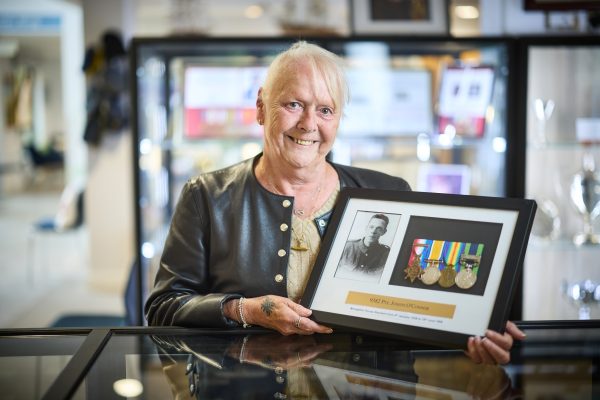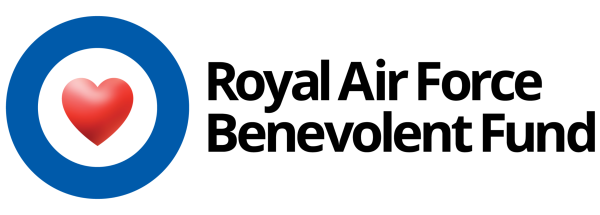A World War One hero’s military medals which his widow had kept in a tin box have gone on display at the veterans’ care home where he lived for 30 years, after his family donated them to its museum.
Cavalryman Joseph O’Connor, serving with the 13th Hussars, was wounded by shrapnel and thrown from his horse during a battle in Mesopotamia – now Iraq – in November 1917.
His injuries are thought to have contributed to him suffering from creeping paralysis several years later. He gradually lost muscular function, and eventually became paralysed from the neck downwards.
In 1938, Joseph was moved to Broughton House Veteran Care Village in Salford, and he was cared for there until he passed away in 1968 at the age of 73.
His collection of medals comprises the 1914 Mons Star, a campaign medal which was issued to original members of the British Expeditionary Force, the 1914-19 British War Medal, the 1914-19 Allied Victory Medal and an Indian General Service Medal with an Afghan North West Frontier clasp.
They were kept by his wife Hannah in a tin box for years at home in Hyde, Tameside, and then by their daughter Kathleen.
When Kathleen’s flat was flooded, her daughter Elaine Prince – Joseph’s granddaughter – took the cherished medals to her home, also in Hyde, for safekeeping in a bedside drawer.
Elaine, 76, has had them cleaned, re-ribboned and framed and has now donated them to Broughton House, where they are prominently displayed.
Elaine,who was tearful with emotion at seeing them on display, said:
“Broughton House was my beloved grandad’s home for many years, and he was so happy here that we felt it was right to donate the medals to the museum. This is where they belong.
“He would certainly approve, and we are extremely proud to see them exhibited.
“Grandad was an adored and revered person, and I have vivid childhood memories of visiting him nearly every week at Broughton House. He was a hero to us, although he didn’t talk about the war.
“Even though he could only move his head due to his condition, he was always jolly. The family was happy that he got to live for many years in such a nice place.
“He used to say that he could see the trees and the flowers and hear the birds singing, and that there were residents worse off than him because they were disfigured or had lost limbs.”
Great-grandmother Elaine, a retired shop assistant who is married to former engineering worker Jimmy Prince, was one of three children born to Kathleen, who is 102.
“Mum is happy that we’ve had the medals spruced up and have donated them to Broughton House,” said Elaine.
“A friend arranged to have them cleaned, re-ribboned and framed, and they look fantastic.”
Broughton House historian and museum curator Owen Hammond, who researched Joseph’s story, said:
“We are very proud to have these medals on display. He was a genuine hero of World War One who fought in some ferocious battles and many gallant actions.
“We’re so grateful to Elaine for her immense generosity in donating them. It’s hugely appreciated. This is the oldest collection we have that belonged to a former resident, so it has a lot of significance for Broughton House.
“It’s a really important and valuable addition to our exhibits. alongside those of other heroes of the world wars.”
Joseph was born in October 1894 and lived in Hyde.
In 1912 aged 18, he enlisted at Ladysmith Barracks in Ashton-under-Lyne and in March 1913 he was posted to the 11th Hussars (Prince Albert’s Own) cavalry regiment.
In August 1914, just 11 days after war was declared against Germany, Joseph and his regiment were deployed to France as part of the British Expeditionary Force.
The 11th Hussars took part in the Battle of Mons and, with the 2nd Dragoon Guards, made a cavalry charge which led to the capture of eight enemy guns at Néry in northern France in September 1914 as part of the Great Retreat.
They then fought at the Battle of Messines in October 1914 and at the Second Battle of Ypres in April 1915.
In October 1915, Joseph was assigned to the 13th Hussars, and in June 1916 the regiment was deployed to Mesopotamia. Its troops took part in the Second Battle of Kut in February 1917 and the capture of Baghdad a month later.
Joseph was later posted to India and, following the end of World War One, served in the Third Anglo-Afghan War.
He returned to England in 1920 but in 1924 began suffering from creeping paralysis and was discharged from the army. By 1928, he was in a wheelchair and moved to Broughton House when Hannah was unable to adequately care for him at home.
Broughton House was established in 1916 to care for soldiers and sailors injured during World War One. Since then, it has cared for more than 8,000 veterans.
The museum houses hundreds of military medals along with other artefacts and items including memorial plaques which are known as the Dead Men’s Pennies, 19th century battle swords, model ships, uniforms and other military gear.


















